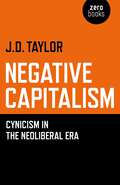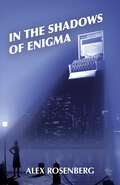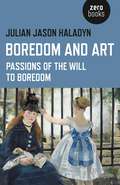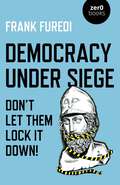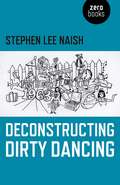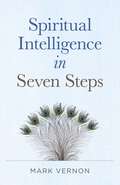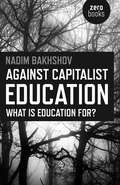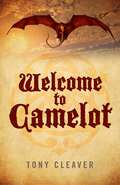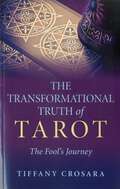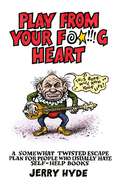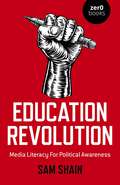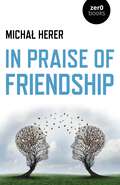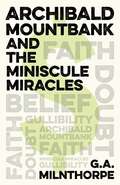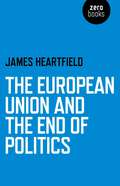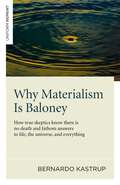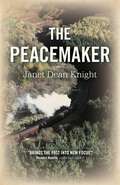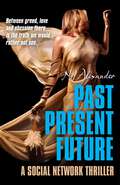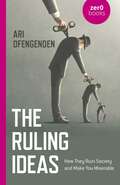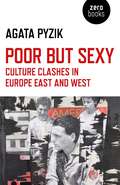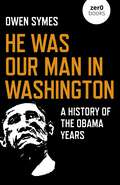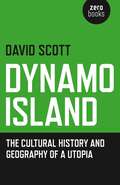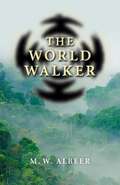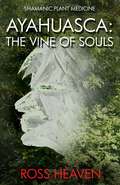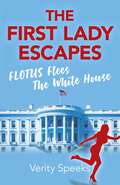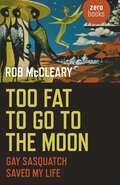- Table View
- List View
Negative Capitalism: Cynicism in the Neoliberal Era
by J.D. TaylorNegative Capitalism: Cynicism in the Neoliberal Era offers a new conceptual framework for understanding the current economic crisis. Through a ranging series of analyses and perspectives, it argues that cynicism has become culturally embedded in the UK and US as an effect of disempowerment by neoliberal capitalism. Yet despite the deprivation and collapse of key social infrastructure like representative democracy, welfare, workers' rights and equal access to resources, there has so far been no collective, effective and sustained overthrow of capitalism. Why is this? The book's central call is for new strategies that unravel this narcissistic cynicism, embracing social democracy, constitutional rights, mass bankruptcies and animate sabotage. Kafka, Foucault, Ballard and de Sade are clashed with the X-Factor, ruinporn, London, and the artwork of Laura Oldfield Ford. Negative Capitalism's polemic is written to incite responses against the cynical malaise of the neoliberal era.
In the Shadows of Enigma: A Novel
by Alex RosenbergIn this standalone sequel to The Girl From Krakow, the greatest undisclosed secret of the Second World War haunts the lives of four people across three continents and fifteen years. The only Second World War secret not revealed soon thereafter was that the Allies had broken the German Enigma codes. This secret was kept for 30 years after the war. In the Shadows of Enigma is a 15 year-long narrative of how knowing the secret changed the lives of four people: Rita Feuerstahl, who learned that the German Enigma had been deciphered by the Poles just before she escaped a Polish ghetto, Gil Romero, her prewar lover whom Rita marries after the war, Stefan Sajac, the infant son Rita had smuggled out of the ghetto and lost track of, and Otto Schulke, the German Gestapo detective who apprehended Rita during the war and suspected that she knew the secret of the Enigma's decoding.
Boredom and Art: Passions Of The Will To Boredom
by Julian Jason HaladynBoredom and Art examines the use of boredom as a strategy in modern and contemporary art to resist or frustrate the effects of consumerism and capitalism. This book traces the emergence of what Haladyn terms the will to boredom in which artists, writers and philosophers actively attempt to use the lack of interest inherent in the state of being 'bored' to challenge people. Instead of accepting the prescribed meanings of life given to us by consumer or mass culture, boredom represents the possibility of creating meaning: &‘a threshold of great deeds&’ in Walter Benjamin&’s memorable wording. It is this conception of boredom as a positive experience of modern subjectivity that is the main critical position of Haladyn's study, in which he proposes that boredom is used by artists as a form of aesthetic resistance that, at its most positive, is the will to boredom.
Democracy Under Siege: Don't Let Them Lock It Down!
by Frank FurediDemocracy Under Siege outlines the long history of anti-democratic thought, explains why hostility to democracy has gained momentum in the current era, and offers a positive affirmation of the principle and the value of democracy.Frank Furedi examines the frequent claim that democracy is a means to an end rather than an important value in and of itself. The prevalence of this sentiment in the current era is not surprising, given that the normative foundation for democracy is fragile, and there is little cultural valuation for this outlook. Until recently, virtually every serious commentator paid lip-service to democracy. However, in recent times the classical elitist disdain for democracy and for the moral and intellectual capacity of the electorate has acquired a powerful influence over public life.
Deconstructing Dirty Dancing
by Stephen Lee NaishRenowned film critic Roger Ebert said Dirty Dancing "might have been a decent movie if it had allowed itself to be about anything." In this broadly researched and accessible text, Stephen Lee Naish sets out to deconstruct and unlock a film that has haunted him for decades, and argues that Dirty Dancing, the 1987 sleeper hit about a young middle-class girl who falls for a handsome working-class dance instructor, is actually about everything. The film is a union of history, politics, sixties and eighties culture, era-defining music, class, gender, and race, and of course features one of the best love stories set to film. Using scene-by-scene analyses, personal interpretation, and comparative study, it's time to take Dirty Dancing out of the corner and place it under the microscope.
Spiritual Intelligence in Seven Steps
by Mark VernonWe live in an age of emergency, exacerbated by a collapse of meaning. Writer and psychotherapist Mark Vernon examines the type of intelligence that, whilst often dismissed and overlooked, is crucial to understand and cultivate if we are to survive and thrive in our times. Spiritual intelligence is the foundation of who we are and our particular type of consciousness. It is the perception identified across wisdom and religious traditions, and known by many names, which can be summarised as the awareness of awareness, and so of being itself. It is the foundation of peace, even in the face of death, as well as purpose and solidarity. The challenge today is to recover and live according to that knowledge. Examining themes from the nature of consciousness to the experience of time, the emergence of our species and the teaching of spiritual adepts, the book is an antidote to rampant AI and a complement to emotional intelligence. It is written without presuming religious commitments in readers and draws on a mix of sources and experience gained from the author's own practices. It advocates pilgrimage and improvisation, virtues over morality, and big histories that do not turn the story of our species into a bleak struggle for survival. The seven steps will help readers identify spiritual intelligence within themselves, unpack why it matters, and suggest how a wider trust in it may be revived.
Against Capitalist Education: What is Education for?
by Nadim BakhshovOut there in the so-called real world the education system is being crushed by the demands of capitalism and, in turn, is crushing those who pass through it, reducing them, diminishing them. The dream of the economic functioning unit. How do we break this? We need alternatives but not just one or two. We need the freedom and education to generate a trillion possibilities. An education system that is as broad as it is deep, that brings back a different type of thinking and a new use of fiction. This book signals the return of the dialogue and the conversation as the ground out of which new realities are born, the root out of which new alternatives are nurtured and explored.
Welcome to Camelot
by Tony CleaverGwen Price works at the Camelot Hotel, Monmouthshire. She is a thoroughly modern miss – very independent; she loves her iPhone and her fashion wear, she flirts outrageously, and she will cheat, lie and steal to get whatever she wants. Why not? Then one day she wakes up in the fifth century in the Court of King Arthur where there are absolutely no creature comforts, society is rigidly hierarchical and challenging social conventions risks getting her branded as a witch. Meanwhile, Lady Gwendolyn of Camelot is warm, generous, innocent, vulnerable and totally dependent on the fifth-century supportive community that she has grown up in. She wakes up in a 21st-century world where possessions define people, personal relations are distant, and everyone is an island. This is a story of how these two learn to cope and adjust; both girls out of their time, and how in turn they affect the very different societies they find themselves in. Welcome to Camelot!
Transformational Truth of Tarot: The Fool's Journey
by Tiffany CrosaraIt's about time a book came out revealing the deep transformational power Tarot possesses for healing- look no further.
Play From Your Fucking Heart: A Somewhat Twisted Escape Plan for People Who Usually Hate Self-Help Books
by Jerry HydePlay From Your Fucking Heart offers absolutely no new wisdom whatsoever. In fact, it could be called an eco book, as its entire contents are recycled. Indeed, it is written with the stated belief that there is no new wisdom, that in fact the experience a reader has whenever they read something and go "Oh wow, that&’s really deep," is one of already knowing, of a part of themselves that was already there waking up to an eternal collective truth.
Education Revolution: Media Literacy For Political Awareness
by Sam ShainA plea for public education nationwide to teach media literacy, and specifically from the left of the political spectrum. Within, the author discusses his journalism curriculum, which includes lessons in media literacy, critical thinking, bias, the political spectrum, economics, current events, and more. Additionally, he makes the case that "politics" belong in the classroom as a mechanism to push back on the looming realities of late-stage capitalism and right-wing disinformation; a highly necessary argument given how teaching these sorts of matters in public schools can be met with angst by parents, administrations, school boards, etc. It's time for people to take back power, information, and education.
In Praise of Friendship
by Michal HererWe are living in the age of decline, or at least crisis, of what might be called a &‘culture of friendship&’. Our existence as social beings is constricted in a triangle whose three apices are: the alienated work, subjected to the principle of ruthless competition, the closed, isolated nuclear family and the national or &‘cultural&’ community constituted in the act of aggression towards a common enemy (the &‘alien&’). It is precisely this constriction that makes the culture of friendship decline, and vice versa: it is this decline that seems to make any other way of life increasingly harder to imagine. However, if we are to resist the temptation of returning to the logic of clashing, violent particularisms and defend ourselves against fascist or fascistoid tendencies that appear on the political horizon, some kind of opening must occur, we must once again be able to experiment with new forms of being together, despite divisions resulting from territorial and cultural identities or family relations. What we need is a renaissance of the culture of friendship. Originally published in Poland, this edition from Zero Books is the first English language publication of In Praise of Friendship.
Archibald Mountbank and the Miniscule Miracles
by G. A. MilnthorpeArchibald Mountbank has the power to make almost anything 1% better. Whether you want to be 1% better looking or 1% taller, Archibald Mountbank is your man. He can even boost your immune system or your willpower... for a fee. Archibald Mountbank, one of the richest (and most hated) men in Britain, is about to retire from his highly contentious "profession". But before he retires, Mountbank's Commercial Manager has accepted an offer to allow Mountbank to be shadowed by a journalist. Alistair Dodd, a cynical journalist commissioned to write a hatchet job biography, gets a rare look into the life and practices of the elusive Mountbank and discovers that everyone needs to believe in something... it's just a question of what.
European Union and the End of Politics
by James HeartfieldEurope is in crisis, but the European Union just gets stronger. Greece, Portugal, Spain and Ireland have all been told that they must submit their budgets to EU-appointed bureaucrats. The "soft coup" that put EU officials in charge of Greece and Italy shows that the Union is opposed to democracy. Instead of weakening the European Union, the budget crisis of 2012 has ended up with the eurocrats grabbing new powers to dictate terms. Over the years the forward march of the European Union has been widely misunderstood. James Heartfield explains that the rise of the EU is driven by the decline in political participation. Without political contestation national parliaments have become an empty shell. Where once elites drew authority from their own people, today they draw authority from the European Union, and other summits of world leaders. The growth of the European Union runs in tandem with the decline in national politics. As national sovereignty is hollowed out, technocratic administration from Brussels fills the void. This account of the rise of the European Union includes a full survey of the major schools of thought in European studies, and a valuable guide to those who want to take back control.
Why Materialism Is Baloney: How True Skeptics Know There Is No Death and Fathom Answers to life, the Universe, and Everything
by Bernardo KastrupThe present framing of the cultural debate in terms of materialism versus religion has allowed materialism to go unchallenged as the only rationally-viable metaphysics. This book seeks to change this. It uncovers the absurd implications of materialism and then, uniquely, presents a hard-nosed non-materialist metaphysics substantiated by skepticism, hard empirical evidence, and clear logical argumentation. It lays out a coherent framework upon which one can interpret and make sense of every natural phenomenon and physical law, as well as the modalities of human consciousness, without materialist assumptions. According to this framework, the brain is merely the image of a self-localization process of mind, analogously to how a whirlpool is the image of a self-localization process of water. The brain doesn't generate mind in the same way that a whirlpool doesn't generate water. It is the brain that is in mind, not mind in the brain. Physical death is merely a de-clenching of awareness. The book closes with a series of educated speculations regarding the afterlife, psychic phenomena, and other related subjects.
The Peacemaker: A Novel
by Janet Dean KnightAs the war to end all wars is about to be followed by another, a young woman finds her life taking the same tragic course as her mother's. One night in the summer of 1938 Violet Lowther&’s mother Peggy is dying, her father Ellis is drunk in the pub, and Violet&’s life is being ruined behind a dance hall in Barnsfield by a young miner who doesn&’t look like Clark Gable after all. By September, the British Prime Minister is flying to Munich to try to make peace with Hitler, and in the same week, Violet travels to the remote moorland of Thorndale to visit relatives, escaping her own war with her father. But when Violet learns the truth about Ellis&’ love for Peggy, will she finally be able to make her peace with him? The Peacemaker is a story of buried family secrets and the search for understanding from one generation to the next, and between men and women. Set at a pivotal moment in history it exposes how, in hiding our darkest experiences, the same human tragedies occur over and over again. 'A deftly handled historical novel with a modern twist.' Carole Bromley, author of The Stonegate Devil
Past Present Future: A Social Network Thriller
by N J AlexanderFlash cars and country house, but all is at stake. JUST ONE CLICK is all it would take for thirty-something mother-of-two Nicole Hollis to remove the sexy "what if" man she lusts after from her Facebook... But she just can 't do it. Instead she allows his games to undermine her relationship with older, sophisticated Richard and her sanity spirals when events she can't fathom escalate. Nothing in her life is what it seems and who is really in control? A novel inspired by real events sensationally featured in the Daily Mail, Daily Mirror and Woman Magazine in 2012.
The Ruling Ideas: How They Ruin Society and Make You Miserable
by Ari OfengendenIdeas that are employed to legitimize and make us consent to authority and its hierarchies also disempower us, leaving us anxious, depressed, and discontent. They are constantly hammered into us by the media, by our friends and family, and by institutions. They also come to us by way of films, motivational speakers, business gurus, as well as in the actions we take in our everyday lives and in the experiences of who we are. In The Ruling Ideas: How They Ruin Society and Make You Miserable, Ari Ofengenden examines many of these ideas, such as the entrepreneurial-self, the utility-oriented economic man, technological progress, virtues and values, as well as family values, God, nation and race. Ofengenden provides a deft analysis, on the one hand, of the beliefs we hold, the ideas behind them that make us consent to the social order, and how we often fool ourselves into believing these ideas; on the other hand, the author proffers a way to combat these ideas, to live without them and develop alternatives.
Poor but Sexy: Culture Clashes in Europe East and West
by Agata Pyzik24 years after the fall of the Berlin Wall, Europe is as divided as ever. The passengers of the low-budget airlines go east for stag parties, and they go West for work; but the East stays East, and West stays West. Caricatures abound - the Polish plumber in the tabloids, the New Cold War in the broadsheets and the endless search for "the new Berlin" for hipsters. Against the stereotypes, Agata Pyzik peers behind the curtain to take a look at the secret histories of Eastern Europe (and its tortured relations with the "West"). Neoliberalism and mass migration, post-punk and the Bowiephile obsession with the Eastern Bloc, Orientalism and "self-colonization", the emancipatory potentials of Socialist Realism, the possibility of a non-Western idea of modernity and futurism, and the place of Eastern Europe in any current revival of "the idea of communism" -- all are much more complex and surprising than they appear. Poor But Sexy refuses both a dewy-eyed Ostalgia for the "good old days" and the equally desperate desire to become a "normal part of Europe", reclaiming instead the idea an Other Europe.
He Was Our Man in Washington: A History of the Obama Years
by Owen Symes'Owen Symes is a rising young star who has created a masterful social history of the Obama years. The clarification of Obamacare and other policies for health and human services is especially helpful. As we move forward, Symes&’s analysis helps us shed our illusions so we can avoid making the same mistakes all over again.' Howard Waitzkin, Distinguished Professor Emeritus of Sociology, University of New MexicoHe Was Our Man in Washington provides a detailed narrative of the years of the Obama administration gravitating around six key topics: the War on Terror, the Great Recession, marginal struggles, the Affordable Care Act, climate change, and Indigenous issues, that sit at the intersection of the other topics. Each chapter begins with a brief account of the historical context within which the Obama administration acted. The result is a fair-minded but highly critical interpretation of president Obama and his brand of "hope and change," grounded in a reality that goes beyond mere headlines.
Dynamo Island: The Cultural History and Geography of a Utopia
by David ScottDynamo Island is an account of a contemporary ideal world set in an Ireland-sized island in the middle of the Atlantic ocean. It expresses the possibility of a modern society living in harmonious ecological balance with its environment. The ethos of the place is built around the notion of the human being as a dynamo managing and self-regulating energy in a way that draws on without harming the natural world. One of the island&’s main features is that there are no cars, only bicycles along with a comprehensive public tram and electric train network.
World Walker
by M. W. AlbeerExploring forgotten history and the nature of reality, The World Walker is an adventure of magic and mystery, set during a world-transcending struggle for freedom in a future time of global supremacy. During a time when the hidden leaders of the world are converging into a global elite oligarchy, a common problem of rebellion is spreading and about to reach a pinnacle. Nobody can see this more clearly than Jen, a Raiceman soldier, desperately wishing to escape a life of combat and explore his roots and Elera, who finds herself drawn into a sacred journey to rediscover the true history of humanity. Jen and Elera soon discover their interwoven parts in a story that has unfolded throughout antiquity. Wise protectors and powerful demons step from the shadows to reveal their part in the history of the universe. New worlds open, as those craving power and those seeking freedom are brought together in a series of melodic events. A story of hope, courage and freedom, The World Walker explores the physical, dream and spirit realms of existence.
Shamanic Plant Medicine - Ayahuasca: The Vine of Souls
by Ross HeavenThe Shamanic Plant Medicine series acts as an introduction to specific teacher plants used by shamans in a variety of cultures to facilitate spirit communion, healing, divination and personal discovery, and which are increasingly known, used and respected in Western society by modern shamans as a means of connecting to spirit. Ayahuasca is the shamanic medicine of the Amazonian rainforest and has been used by shamans for millennia to induce visionary states wherein they astrally travel to other locations, see the future or carry out healings for others. It is increasingly used in the West and is perhaps the best known of shamanic plant teachers.
The First Lady Escapes: FLOTUS Flees The White House
by Verity SpeeksPresident Rex Funck is a loutish, lying old bully whose affairs have deeply hurt his stunning wife Natalia, a former model from Slovakia. Now he wants to get her pregnant so voters will see him as a macho stud and re-elect him in a landslide. Natalia despises Funck too much to go through with it. With the help of Angel, her gay Mexican hairdresser and BFF, she secretly flees the White House. To take her place they leave Moon, a ballsy trans woman who impersonates FLOTUS at a Miami drag-queen show. Natalia&’s suspenseful escape becomes a personal journey of self-awareness with unexpected twists and outrageous characters. Meanwhile, when the truth comes out about Moon at the White House, all hell breaks loose. In The First Lady Escapes: FLOTUS Flees the White House, Natalia proves herself a true American hero by saving her beloved adopted country from getting Funcked. 'A rippingly funny and surreal lampoon, the comic relief we so desperately need from the twisted absurdity of our current political horrors. It will leave you gasping with laughter and Trumpetized all at the same time.' 'I can&’t stop laughing! I&’m buying a hundred copies to pass out at the next Women&’s March!'
Too Fat to go to the Moon: Gay Sasquatch Saved My Life
by Rob McClearyIn 2030 America is broke. When NASA is forced to raffle off a trip to outer space and the orbiting Houston Astrodome, Empire State Building and Statue of Liberty, the ticket is won by a guy from Cleveland who is so fat he can&’t make it out of his own house, let alone get crammed in a rocket ship. Instead he auctions the ticket off, and the winning bid belongs to the patriarch of the Van Kruup family, an American dynasty founded on coal, railroads, and masturbation (not necessarily in that order). But when they lose their inter-generation fortune in the Great Funk Crash, Stanely Van Kruup, sole heir to the Van Kruup fortune, is evicted from the ten thousand acre estate in rural Pennsylvania he has left only once since birth and must search for his (presumed dead) older brother in an attempt to restore his inheritance. Too Fat to go to the Moon is Zero Books' latest foray into avant-garde fiction.
